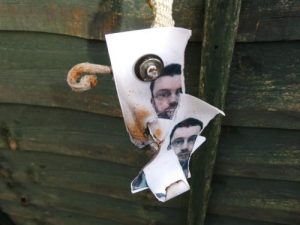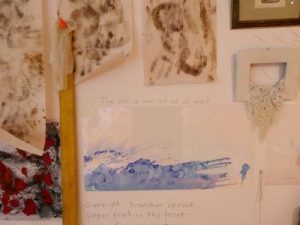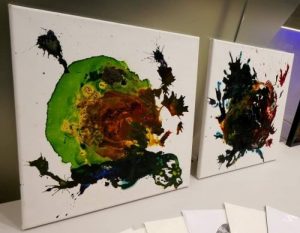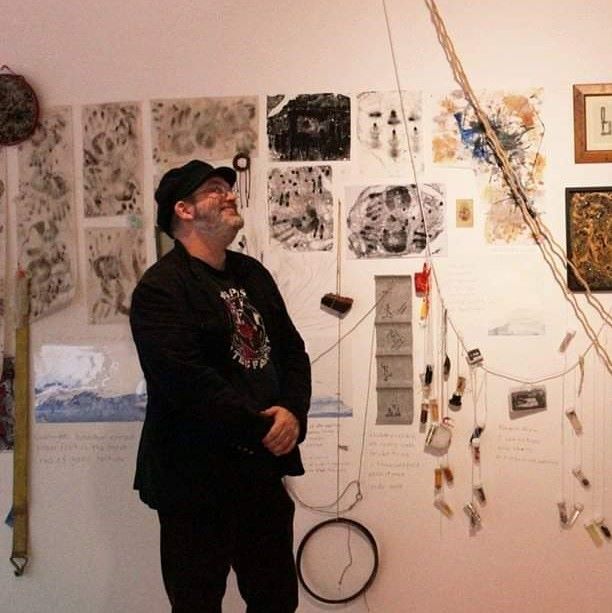by Anita Foxall.
If you are in touch with Southampton’s creative scene, Dave Hubble is a local artist and poet who you will almost certainly have heard of.
Dave is a wonderful wordsmith and a committed visual artist, who uses a variety of materials to create fantastic pieces of art with focus on lost and abandoned objects and materials. What’s more, he supports and promotes other visual artists as a curator for exhibitions at The Art House in Southampton, with the main aim of supporting local, or locally active, artists using a variety of media, and giving them somewhere to show and sell their work (something Dave tirelessly reiterates the city is short on).
Beetle expert
It might, then, come as a surprise to hear that this intensively creative person comes from a science background, ecology to be more precise, and ended up becoming a beetle specialist!
 In fact, if you search his poetry publications online using his name, you will be presented with books about Leaf Beetles (AKA the Chrysomelidae), and yes, it is the same Dave Hubble.
In fact, if you search his poetry publications online using his name, you will be presented with books about Leaf Beetles (AKA the Chrysomelidae), and yes, it is the same Dave Hubble.
Dave has told us he has always had a latent urge to be an artist and a few years ago in his mid-40s, a combination of events prompted him towards a major change of direction.
As an artist, he does work in traditional media (paintings, ink drawings), but he has lately developed a strong interest in installation work using found and waste material.
Dave explains: “I am interested in humanity’s (over)use of resources and the idea that we’re living in the Anthropocene, a geological era characterised by the effects of human activity.” In fact, some of pieces of art include materials such as dolls eyes, buttons, cloth or even spent cartridges.
Influences
Russian installation artist Ilya Kabalov is one of his key influences, due to his view of economic systems, mainly the gap between capitalism and communism. Another of his influences is Cornelia Parker (best known for ‘Cold Dark Matter’ AKA The Exploding Shed) for her (ab)use of existing items. She crushes them under a steamroller or blows them up and reassembles them.
 Dave, the poet, started around the same time he encountered events run by Artful Scribe, as they were looking to develop new writers. Along with a few friends who urged him to try, he braved performing his poetry at open mic events such as Moving Voices (again at The Art House) and Write a Note (now at Caskaway). This led onto bookings and publications (namely two books in print, plus a number of poems in literary journals). He is currently writing a chapter about ‘Style and Technique in Spoken Word’ for a book being published through Bath Spa University.
Dave, the poet, started around the same time he encountered events run by Artful Scribe, as they were looking to develop new writers. Along with a few friends who urged him to try, he braved performing his poetry at open mic events such as Moving Voices (again at The Art House) and Write a Note (now at Caskaway). This led onto bookings and publications (namely two books in print, plus a number of poems in literary journals). He is currently writing a chapter about ‘Style and Technique in Spoken Word’ for a book being published through Bath Spa University.
Ghost river
Dave is also one of the founding members of Ghost River, a Southampton-based poetry collective. Their most recent event, a poetry trail around the city (commissioned by the NST), was his core idea/project that gave birth this collective.
Simon Armitage, Susan Richardson, Hannah Silva and Ross Sutherland are only a few of his influences.
 A satirical, observant poet, who writes superb little vignettes of life, as well as about the beauty in the mundane, who will delight you with his eloquent spoken word performances about abandoned pasties, pencils and fatbergs.
A satirical, observant poet, who writes superb little vignettes of life, as well as about the beauty in the mundane, who will delight you with his eloquent spoken word performances about abandoned pasties, pencils and fatbergs.
Poet, painter, artist, curator, scientist, soulful human being. These are the many phases of Dave, which you can briefly taste here by reading the poems he has kindly sent us for publication.
Poetry
Trans-Pennine Express
Hidden in the pages of The Devil and Miss Prym,
an untorn rail return in perforated orange,
suburb-to-airport on a Thursday
sixteen years ago – seeing someone off
or home again?
Maybe carrying a cardboard sign
to meet a visitor with a smile
and Sharpied surname, or
spotting aeroplanes,
collecting alphanumerics in a notebook –
unlikely as 06:10 is such an early start.
Work’s a possibility – check-in desk, shop,
other operations;
surely cabin crew get taxis
and pilots drive. In any case,
they’d be off along Great Circles
too far for there-and-back in just one day
and like in airline ads, never lonely,
so would have no need to pass the time
with Coelho’s brand of novelised philosophy.
I look again
and see the spine’s unbent,
pages faintly yellowed but pristine –
this book’s been storage for another story,
its own words never read ‘til now.
The Hobbyist
Falco subbuteo flicks wingtips,
tilts with rapid twists,
catches dragonflies in flight
feeds without landing, dropping
legs and other chitinous appendages,
dry rain in her wake. Swifter than swallows,
she crosses savannah, desert and the Med,
dodges gunmen lurking on peninsulas
and at dusk, singles out
unwary flittermice, flies on;
La Manche is gone in minutes,
blocks of dry heath calling out
like males. She picks
the best, an old crow’s nest,
spinney edge and ponds rich
with insects. They mate, hatch eggs,
tend young, then,
feeling autumn air,
uncouple and depart,
a thousand miles and many more,
switching hemispheres
every winter,
every spring,
repeat.
Down the road
It’s a long time since I saw so many warning notices,
every other door sporting “Beware of the Dog”,
“No Cold Callers”, “Shut the Bloody Gate.” One barks
in colloquial Alsatian, “I can reach the gate in five seconds,
can you?” next to a cheery “Wilkommen”
and welcome-mat. The “Danger of Death” signs
riveted to pylons, power cables, substations,
all feel more hospitable than these miniature front yards
that stretch like disused branch lines
along the quarter-mile of railway-siding cul-de-sac,
little squares that try too hard to punch above their weight,
bantams breeding gnomes among the slate-chips,
where one great weathered slice of treetrunk states
in rough white-painted sanserif Gesegnet Ist,
though what is being blessed’s unclear.
As curtains twitch (and twitch they do), it seems
the tinier the plot, the more fiercely it is guarded,
and as I read a thousand plaques that paraphrase as
“Go away, get off our patch!” I have to wonder how
these smallest of small-island-dwellers
ever get their mail.
Four tapestries (#JHGRichter)
Mouths go O
in univocal joy of wow
at warp and weft
computerised
from finest thread of
every Pantone;
fingers itch
to feel
and stroke, to
touch
behind the Please Don’t
with inappropriate
investigations of construction,
“How are they attached?”
to curtain-twitch,
shine light upon black backing-fabric keeping
Abdu Yusuf Iblan Musa
safe from snags
or rubbing on the wall,
four woven Mandelbrots
of abstract squeegee-smears,
peer close…
closer,
still
the fullest depth of detail
will elude your eye,
silk pixels reinstating edges
lost to oily drag;
step back, see
crowns emerge,
trees reflect in fjords,
and bats;
oh, most wondrous, complex Rorschachs,
we’re all now planning
art-heists,
thoughtcrimes made on neural looms –
which one each would take
and whether
ram-raid,
inside job
or roll-it-up-and-run.
Brooch
I am formed from ore,
galena unborn in bedrock,
awaiting the point of an antler pick
to chip me free, drop me in the fire and
smelt me, crucibled for pouring,
moulding in bone or soapstone, to seep
and settle into each carved detail –
in my small disc, two beaded rings
around a bird pecking at a cross.
I cool and set, am tapped
onto an oakbench, soft alloy lugs
added with a pin. I’m worn on wool,
the tunic of a minor merchant, lead
against his chest, a poor adornment,
a lowly coin-like evocation of his faith. He
trades me to a shipwright, a man
of adze and timber, part-payment
for a mended spar, and then I’m lost,
snagged and dropped in silt.
I wait.
I wait. I wait.
I wait. I wait.
I wait until
the scrape of steel on gritty soil
awakens me, I see
the first faint glimmering
of light for a thousand years;
I’m prised out, teased from mud,
brushed clean,
recorded, drawn and numbered –
item 31/1653, Context 5682,
diameter 20 mm. I am cooed over
for the state of my patina,
religious symbolism, uniqueness
of design. I’m boxed and stored,
catalogued and published in a book of
non-ferrous archaeology. It’s dark again,
like burial in sediment,
I wish so very much I could be worn,
to be seen once more on the streets
of Hamwic, the city I am made of,
where by a Saxon craftsman
I was born.

